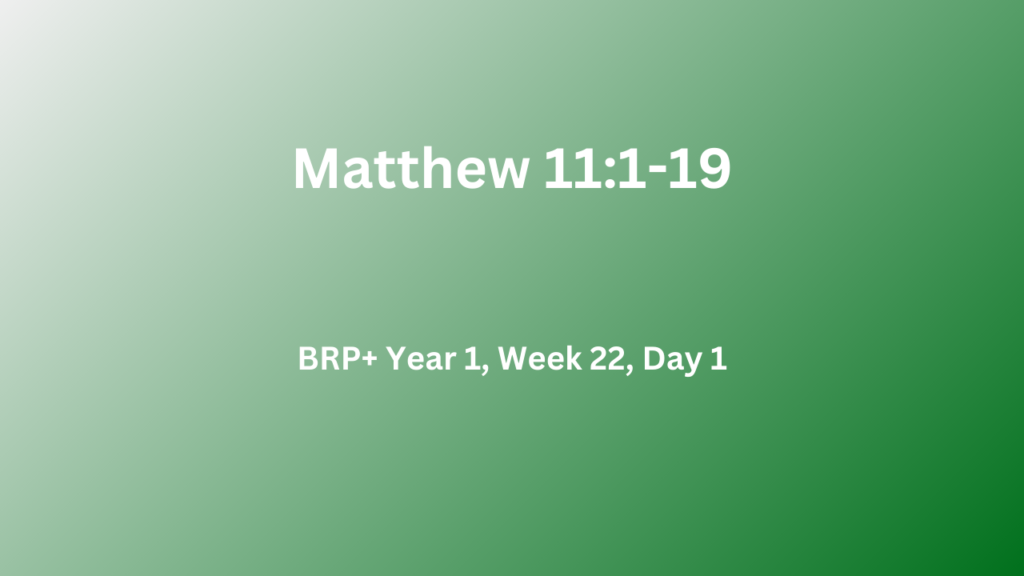Matthew 11:1-19
Q.1. Where did Jesus go after commissioning the twelve? Why did John have doubts? Was he wise to express them to Jesus? How did Jesus answer John? – (Mt.11:1-6)
Jesus had probably retreated to a quieter area around Capernaum to commission His twelve disciples. He then taught and preached throughout the cities of Galilee from where they had come (Mt.11:1 c.f. Mk.14:70). John had been suffering in prison and seemed to struggle with doubts about Jesus. He wisely sent some of his followers directly to Jesus with his doubts. They asked – Are You the Expected One, or shall we look for someone else? (Mt.11:3 c.f. Jn.1:32-34). Lengthy trials can shake our faith. Jesus could have simply told John that He was. However, He kindly gave John an objective response to his question – … Go and report to John what you hear and see (Mt.11:4). To this Jesus added another proof by quoting the Scriptures that pointed to the Messiah – the blind receive sight and the lame walk, the lepers are cleansed and the deaf hear, the dead are raised up, and the poor have the gospel preached to them (Mt.11:5 c.f. Isa.35:5-6; 61:1). It is not enough to make bold claims. These should be backed up by the Word of God.
Q.2. How could you recognise a prophet of God? How did Jesus commend John? What did Jesus mean by elevating those least in the Kingdom of Heaven? – (Mt.11:7-11)
In commending John, Jesus pointed to the prophet’s humble existence. The prophets were fearless and uncompromising, not – a reed shaken in the wind (Mt.11:7). Their clothing and accommodation were not that of the rich and famous (Mt.11:8). John distinguished himself by being God’s mouthpiece, His messenger – who will prepare your way before you (Mt.11:10). Jesus paid John the highest compliment, by declaring – Truly I say to you, among those born of women there has not arisen anyone greater than John the Baptist! (Mt.11:11). Nevertheless – the one who is least in the kingdom of heaven is greater than he (Mt.11:11). With Jesus, everything was becoming brand new.
Q.3. What has changed since the role of the Law and the prophets? Why does it take strength to enter the kingdom? In what way was John like Elijah? – (Mt.11:12-15)
The Law and the prophets of the Old Testament all pointed to Christ, Who fulfilled the promises of God. John had suffered violence at the hands of Herod. Many others would oppose Jesus. The entering of God’s kingdom would not happen naturally but would require purpose and force against this opposition (Mt.11:13). Elijah had suffered persecution from Ahab and Jezebel in his time. Jesus referred John to the prophecy of another Elijah – 5 Behold, I am going to send you Elijah the prophet before the coming of the great and terrible day of the Lord. 6 He will restore the hearts of the fathers to their children and the hearts of the children to their fathers, so that I will not come and smite the land with a curse (Mal.4:5-6 c.f. Lk.1:17). Jesus warned His disciples that to follow Him would guarantee opposition and rejection. He promised no easy way into His kingdom.
Q.4. How did Jesus evaluate His generation’s response to John and Himself? What made their response inconsistent and unacceptable? – (Mt.11:16-19)
Jesus likened His generation to children who easily squabble over trifles. He exposed their utter hypocrisy in charging the reclusive John the Baptist with having a demon. As well, they dismissed the Son of Man as an unworthy glutton and drunkard, for befriending the tax collectors and irreligious Jews. Both were totally false accusations- … Yet wisdom is vindicated by her deeds (Mt.11:19).

